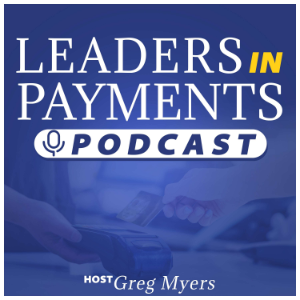
Leaders In Payments
Business & Economics Podcasts
Hear directly from C-level executives in payments/fintech about industry trends, successful strategies, products, services, and what the future holds for the payments/fintech industry. We cover the entire industry from merchant acquiring, payment processing, ISOs, payfacs, fraud, security, issuing, b2b, fintech, to start-ups, if it goes on in payments we will be talking about it.
Location:
United States
Description:
Hear directly from C-level executives in payments/fintech about industry trends, successful strategies, products, services, and what the future holds for the payments/fintech industry. We cover the entire industry from merchant acquiring, payment processing, ISOs, payfacs, fraud, security, issuing, b2b, fintech, to start-ups, if it goes on in payments we will be talking about it.
Language:
English
Website:
https://leadersinpayments.com/
Special Series: Focus. Build. Win. with James Derby, EVP, Merchant Facing Product at Payroc | Episode 441
Duration:00:21:51
THE SIGNAL: U.S. to LATAM — PPRO’s Cross-Border Advantage
Duration:00:32:23
Special Series: Focus. Build. Win. with Jim Oberman, CEO of Payroc | Episode 439
Duration:00:33:37
Special Series: The Future of Modern Payments with Sal Karakaplan, Chief Strategy Officer at The Clearing House
Duration:00:26:13
Kevin Sisk, President of Bill360 | Episode 348
Duration:00:32:09
Ruston Miles, Founder, Chief Strategy & Development Officer at Bluefin | Episode 437
Duration:00:35:50
Special Series: Powering Payments Together with Leslie Legel, Dir. of Payments at CenterEdge Software | Episode 436
Duration:00:22:57
Special Series: Modern Finance with John Rubinetti, President of B2B Payments at Deluxe | Episode 435
Duration:00:21:34
Brandon Spear, CEO of TreviPay | Episode 434
Duration:00:25:53
Leigh Amaro, Head of North America at Swift | Episode 433
Duration:00:21:58
Special Series: Powering Payments Together with Conn Byrne, Executive Director, Integrated Payments at Payroc | Episode 432
Duration:00:29:54
Modern Finance: AP Automation with Steve Buchberger and Heather Dawood from Deluxe | Episode 431
Duration:00:19:56
Special Series: Powering Payments Together with Adam Oberman, President of Payroc | Episode 430
Duration:00:30:39
John Caplan, CEO of Payoneer | Episode 429
Duration:00:21:37
Jonathan O'Connor, Division President, Third-Party Payments at Synovus | Episode 428
Duration:00:22:52
AI in Payments Series: Featuring Payarc Co-Founder & President, Jared Ronski | Episode 427
Duration:00:16:49
Special Series: Modern Finance with Pat Moye, Executive Director of Product Innovation, Receivables at Deluxe | Episode 426
Duration:00:31:01
AI in Payments Series: Featuring Payarc VP of ISV, Zac Schneiderman
Duration:00:25:34
Taylor Lauber, CEO of Shift4 | Episode 424
Duration:00:23:54
Eyal Lifshitz, CEO of Bluevine | Episode 423
Duration:00:24:13